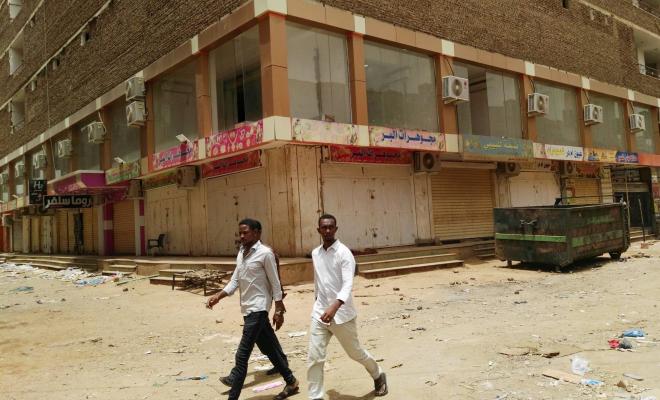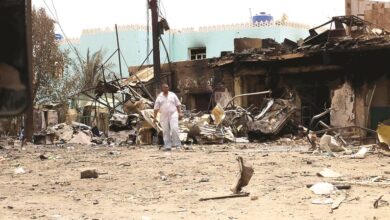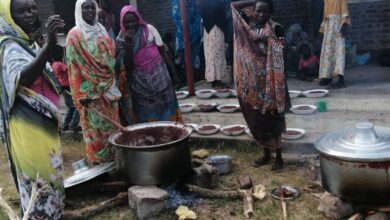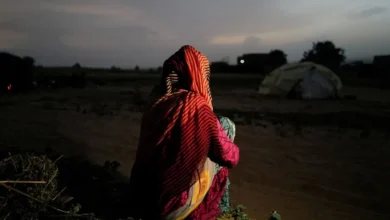Rising Prices Push Most Khartoum Residents Below the Poverty Line
Omdurman – Report by Bakhita Zayed Al-Safi

Most residents of Sudan’s capital—Khartoum, Omdurman, and Bahri—are experiencing unprecedented anxiety amid a dramatic surge in the prices of essential commodities, including food, medicine, and fuel. With personal savings depleted, living conditions for the majority have severely deteriorated.
Since the outbreak of the war, daily work has come to a halt for most people stranded in the capital. Salaries for both public and private sector employees have not been paid in over two years. The situation is no better for displaced people who fled to Khartoum, as they too face dire conditions, compounding the ongoing humanitarian crisis.
A Major Concern
Sudanese citizen Amira Ali Ahmed told Mashawir that “meeting basic daily needs, even just enough for two meals, has become a major concern for families in Khartoum State due to the harsh conditions everyone is facing.”
She added that most families now rely on just two meals per day due to dwindling resources and the loss of income sources. “Prices have become unbearable for all families. The cost of living has skyrocketed beyond what most can afford,” she said.
Soaring Costs
Sudanese citizen Abdel Monem Al-Taj explained that he supports 12 family members, and what used to cost 20,000 Sudanese pounds daily for essentials now requires at least 50,000 pounds due to price hikes.
He noted that were it not for financial support from relatives abroad, he wouldn’t be able to cover basic needs. “The citizen is facing extreme hardship amid the collapsing economy. The lack of job opportunities has deepened poverty. People are surrounded by goods they cannot afford, unable to meet even their children’s needs.”
Al-Taj pointed out that fruits, dairy products, and sweets for children have become luxury items, with families prioritizing spending on basic meals instead. He called on the government to support the capital’s residents and ease the burden of living expenses, stating that reconstruction cannot begin without a healthy and nourished population—“health begins with food, not just medicine.”
Market Stagnation
The depreciation of the Sudanese pound against foreign currencies has caused severe stagnation in markets across Khartoum, Omdurman, and Bahri.
Many traders have complained about the falling pound and rising dollar, especially after commercial activity slowed. Increased taxes have driven up the prices of essential goods, forcing traders to raise prices significantly to cover losses.
Merchant Hussein Al-Tayeb told Mashawir: “Goods have been piling up on shelves for more than a week due to a decline in purchasing power in Omdurman amid a deep economic crisis.” He added, “People no longer have the money to buy, and we are facing a recession.”
The Impact of War
Economic affairs specialist Al-Khair Mahjoub told Mashawir that Sudan is in a crisis, and the national budget is suffering due to a lack of revenue. As a result, the authorities have turned to the public for funding—burdening them with high costs for food, water, electricity, and fuel, along with continuous increases in taxes and customs fees. “The state has adopted a purely extractive mentality to fund the war and run the government,” he said, “creating immense financial pressure and placing unbearable strain on citizens.”
Mahjoub added, “The country is witnessing runaway inflation, especially in essential goods. The economic downturn is rooted in the war, which has now entered its third year with no resolution in sight. As long as the conflict continues, conditions will only worsen, affecting security, social stability, and other aspects of life.”
Economic Pressures
Echoing these concerns, economic researcher Khalid Jibril told Mashawir that “the Sudanese pound has depreciated dramatically and unprecedentedly against foreign currencies. While the dollar was around 500 pounds before the war, it now hovers around 3,200 pounds.”
He explained that while it’s expected for a currency to lose value during wartime, the lack of decisive government intervention is troubling. “The goal isn’t necessarily to strengthen the pound during the war,” he said, “but rather to implement policies that halt its collapse. Even stopping the decline would be a significant achievement.”
Jibril warned of a bleak economic future if the war continues, as it could drive the exchange rate even higher and further increase the economic burden on the population.
He cautioned that Sudan’s economy is at risk of contraction and entering negative growth territory due to declining production and the falling value of the national currency. He emphasized the urgent need for immediate action to confront the crisis.




